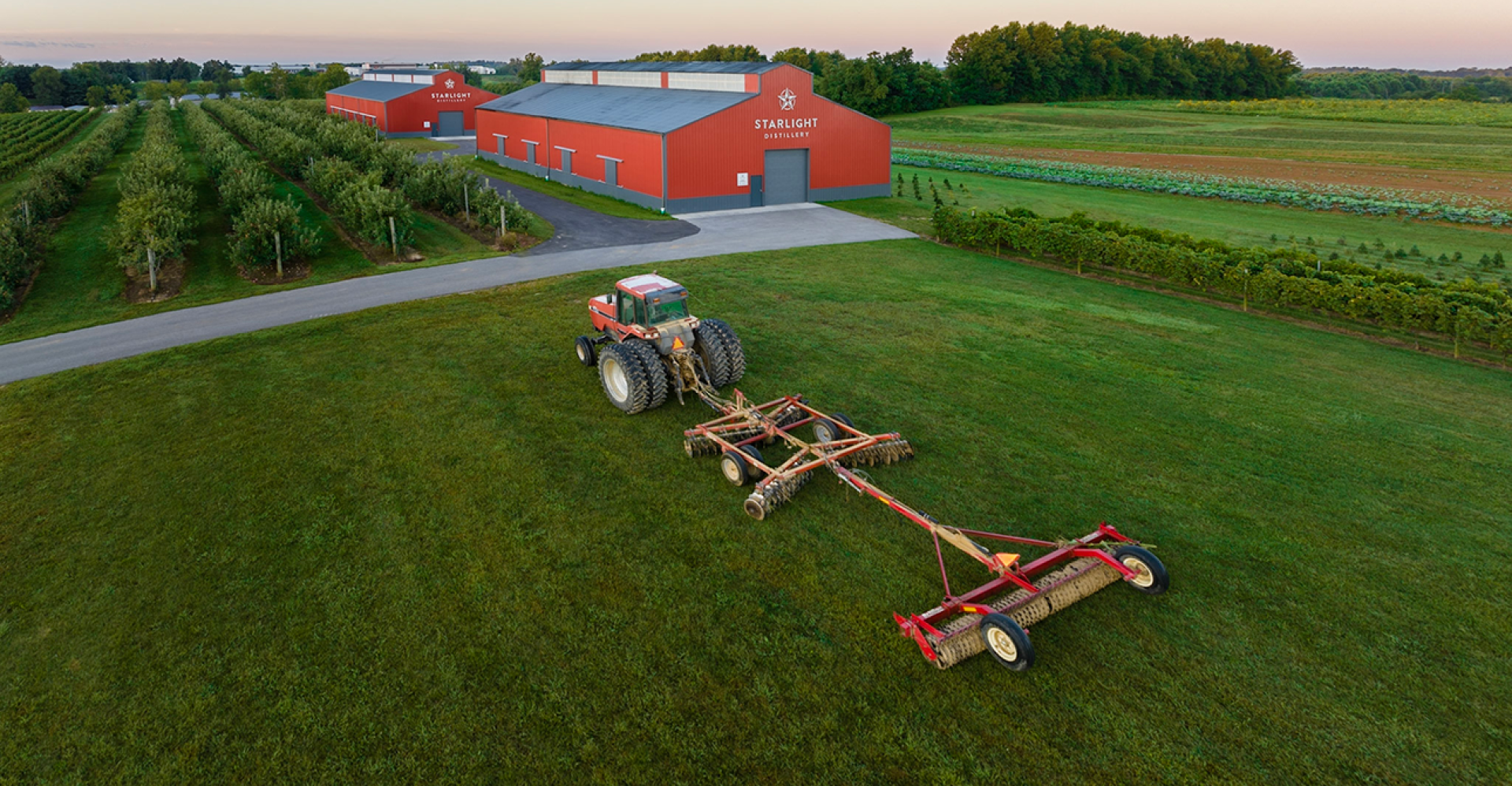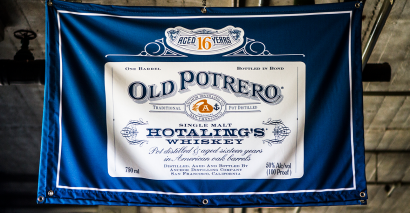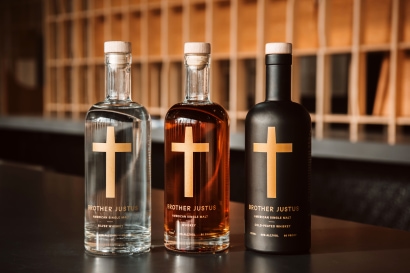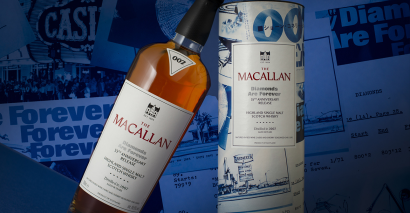
We’d wager that for most people, it’s only natural to think first of Kentucky, and then perhaps Tennessee, when thinking of American whiskey. After all, the two southern states possess rich distilling histories that stretch back hundreds of years, and today Kentucky makes about 95% of all bourbon on the market. But there’s another state right next door with a rich whiskey history of its own: Indiana.
The Hoosier State is home to the city of Lawrenceburg, once known as Whiskey City, USA thanks to its prolific rye production from the mid-19th century up to Prohibition. The city, which lies just west of Cincinnati, and under 2 hours northeast of Louisville, built its first distillery in 1847. Originally called Rossville, it has gone through a series of name changes over the years—from Rossville to Jos. E. Seagram Lawrenceburg, then Lawrenceburg Distillers, more recently MGP, and currently Ross & Squibb. It’s a distillery that has supplied whiskey for hundreds, if not thousands, of brands over the years.
While Rossville/MGP/Lawrenceburg was the only major player in Indiana’s whiskey scene in the decades following Prohibition, a 2013 law known as the Indiana Artisan Distiller’s Permit enabled a fledging craft distilling industry to take hold there, as it allowed distillers to sell directly to consumers on-site, instead of solely through distributors or retail stores. A new class of distillers has thus joined the scene over the past decade, each adding its own color to the state’s distilling fabric and supplementing the sturdy foundation that MGP laid early on. Many emphasize grain-to-glass production as well, highlighting the preeminence of Indiana farmland.
 Ross & Squibb
Ross & Squibb
Lawrenceburg, Indiana
Today, MGP goes by the name Ross & Squibb Distillery, a change made in 2021 as part of an effort to put the focus on its own brands. Of course, the mammoth distiller still makes a great deal of whiskey for other names, the majority of which are start-up craft distillers in need of some immediate releases to hit the ground running. Its own brands include George Remus bourbon, Rossville Union rye, Eight & Sand blended bourbon, and Till wheat vodka. Since MGP’s $475 million acquisition of St. Louis-based distiller and marketer Luxco, also in 2021, some Rossville & Squibb distillate has found its way into a few of the company's brands.
 Starlight Distillery
Starlight Distillery
Borden, Indiana
Starlight Distillery has roots that date back to 1843, when German immigrant Simon Huber arrived in the rural community of Starlight, Indiana. At the time, southern Indiana was renowned for its wines and brandies, and Simon was soon partaking in the distillation of his own, farming the fruit for his wine and brandy from an 80-acre plot of land. Today, the Huber family—now seven generations in—owns over 700 acres of farmland, primarily planted to fruit. They began distilling under the Starlight Distillery banner in 2001, with their first brandy debuting in 2004; their first whiskey, a blend of three- and four-grain bourbons, would come over a decade later, landing on shelves in 2015. These days, in addition to that inaugural Carl T. bourbon, Starlight also makes a variety of ryes, finished whiskeys, brandy, gin, and rum.
 Hard Truth Distillery
Hard Truth Distillery
Nashville, Indiana
Hard Truth got its start in 2015, distilling in the upper floor of Big Woods Pizza Co. in downtown Nashville, Indiana. Three years in, and the distillery opened a new campus, set upon 325 acres about a mile away from its original home and complete with a restaurant and visitors center. By 2018, its distillery was fully operational. Hard Truth has differentiated itself from countless others by use of the sweet mash technique—a distillation process that begins with entirely new ingredients—as opposed to sour mash, and debuted its first Sweet Mash Rye in 2021.
While Hard Truth initially hung its hat on ryes, the distillery premiered its first three bourbons earlier this year: Sweet Mash, Sweet Mash Wheated bottled in bond, and Sweet Mash Four Grain bottled in bond. Hard Truth’s whiskeys are made predominantly from Indiana-grown grains—and some of its releases have been wholly grain-to-glass whiskeys—and all are initially aged in Independent Stave Co. barrels that are dried 18 to 24 months (three to four times the typical amount).
Bear Wallow Distillery
Nashville, Indiana
Bear Wallow is a family-run distillery owned by Susan Spagnuolo, who was among the group working to get the Indiana Artisan Distiller’s Permit enacted in the early 2010s. Bear Wallow opened its doors to the public in 2014, and since then, it’s offered whiskeys made exclusively from Indiana-grown grains. Its current roster consists of five whiskeys: Gnaw Bone straight bourbon, Liar’s Bench straight rye, Wolf Creek four-grain whiskey, and two single barrel whiskeys (a bourbon and a rye). While the distillery uses the standard 53-gallon barrels for aging, the majority of its barrels are just 25 gallons, which enables for more whiskey-to-wood contact (and, in some eyes, an accelerated maturation process).
Spirits of French Lick
West Baden Springs, Indiana
Operating originally as a winery (which still exists today), Spirits of French Lick now makes bourbon, brandy, botanical spirits, and American whiskey, too. The distillery’s claim to fame is it’s the largest pot still distillery in Indiana, focused on making spirits as they would’ve been made prior to Prohibition. Its wheat and corn are grown on a Hoosier Homestead-designated farm (the state-led program recognizes farms that have remained in the same family for a century or more), and it specializes in heirloom grains as well as alternative grains, among them oats, kasha, and buckwheat.
Aside from its unique grain choices, Spirits of French Lick also uses a number of less widely practiced production methods, including low barrel entry proof (the distillate enters at 105) and barrels with low char and toasted staves and heads. Four out of five of its bourbons are also bottled in bond, with the one exception being a white whiskey made from 100% Indiana corn.
Distillery 64
New Albany, Indiana
Suffice to say Distillery 64 had humble beginnings: owner Terry Spine started the distillery in a barn, making his first batch of rye in a plastic 5-gallon bucket and a still made from an old kitchen sink. Nowadays, Distillery 64 has nicer digs, operating out of a 700-square-foot space that specializes in bespoke cocktails and offers not just rye whiskey, but rum, gin, and vodka as well. The distillery’s ryes are unusual, and not technically ryes at that—the flagship Smokin’ Rye is a blend of 20% rye and 80% sugarcane moonshine that’s aged in highly charred oak, qualifying as a distilled spirits specialty, as is Coffee and Rye, a collaboration with local coffee house Talk Coffee that sees rye moonshine infused with coffee.
Old 55
Newtown, Indiana
At Old 55, the focus is on grain-to-glass whiskeys. The distillery, owned by the Fruits family and named for the road it sits on, opened its doors in 2014. Unlike some other distilleries on this list, which emphasize rye production, Old 55 is focused on corn. In addition to a 100% corn whiskey, the distillery offers a 100% sweet corn bourbon, made entirely from sweet corn off the cob grown and harvested from the Fruits farm, as well as a single barrel bourbon distilled from Indiana corn and wheat.
Four Finger Distillery
Indianapolis, Indiana
Four Finger opened in 2014, though at the time it was known as 1205 Distillery. The name change came after co-owner and distiller Brad Colver lost his pinky finger to a saw (an accident that happened as he attempted to install a door at the distillery). In addition to a straight bourbon and a blend of bourbons, Four Finger makes a peated bourbon, which incorporates locally grown malted barley that's smoked with Indiana-sourced peat. The distillery’ flagship facility was housed in the former Virginia Avenue State Bank building in Indianapolis; that location will be shuttered in January, as the building's owners devise new plans for the space. But Four Finger has already expanded its presence, opening a 15,000-square-foot distillery, tasting room, and restaurant in Lebanon, Indiana this past March, and operating another tasting room in Westfield since early 2020.
 Hotel Tango Distillery
Hotel Tango Distillery
Indianapolis, Indiana
Hotel Tango co-founder and distiller Travis Barnes started making whiskey in 2012, following a 4-year career in the U.S. military as a Marine. In 2016, he founded his distillery with his wife, Hilary, and a few friends; they chose the distillery's name as a way to honor his military service, basing it on the NATO phonetic alphabet, with Hotel for Hilary and Tango for Travis. At Hotel Tango, bourbon is the star of the show, specifically a four-grain iteration made from 67.5% corn, 15% rye, 12.5% wheat, and 5% malted barley. A Reserve Bourbon is also in the mix, made from a blend of two whiskeys: one, an Indiana bourbon aged for 5 years and consisting of 99% corn and 1% malted barley, and the other, an Ohio-sourced bourbon aged for 6 years and comprised of 75% corn, 15% wheat, and 10% malted barley.
Indiana Whiskey Company
South Bend, Indiana
Army veteran Charles Florance knew he wanted to open his own distillery, but he didn’t have the funds, so he turned to crowdfunding to get Indiana Whiskey Co. off the ground. His campaign proved successful, and by the end of October 2012 he was ready to break ground on his distillery. It’s quite the Indiana operation, with everything from the stills to the water to the labels and packaging coming straight from the state. That means, of course, that all the grains are also from Indiana, and the distillery offers a wide variety of whiskeys, ranging from bourbon to silver sweet corn whiskey to American single malt to flavored variants.
 West Fork Whiskey Co.
West Fork Whiskey Co.
Westfield, Indiana
West Fork is something of a family affair, created by two brothers—Blake and Julian Jones—and their childhood best friend, David McIntyre. The three Indiana natives left their jobs in finance and cashed out their 401ks to get the distillery off the ground, getting everything in place by 2014. Their focus is 100% grain-to-glass whiskey, with extra emphasis on bourbon—they make a flagship bourbon, wheated bourbon, high-corn bourbon, and high-rye bourbon—and a rye. Aside from the distillery, which offers tours and tastings, West Fork also operates the Mash House restaurant and Stave Cocktail Lounge, both located on the distillery campus.
Cardinal Spirits
Bloomington, Indiana
Like many other distilleries on this list, Cardinal Spirits highlights whiskeys made entirely from Indiana-grown grains. The distillery opened in May 2015, and bottled its first whiskey, an American single malt, in December of that year; since then, its repertoire has grown considerably, now including a bourbon distilled with locally grown heirloom red corn; a four-grain bourbon made with grains from various parts of Indiana; bourbons made with buckwheat and quinoa; and more.




